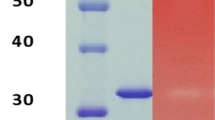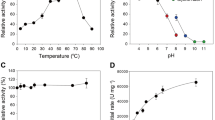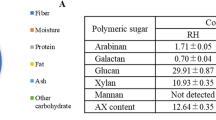Abstract
A PREVIOUS investigation1 has shown that enzymes from Chœtomium globosum are able to hydrolyse wheat straw xylan to xylose with the formation of a series of intermediates, designated a,b,c, … g, which appear on paper-chromatograms with regularly decreasing RF-values, and which are believed to be oligosaccharides with regularly increasing xylose units: xylobiose2, xylotriose, xylotetraose …etc. By heating or storing the enzyme preparations, it was possible to arrest the hydrolysis at the xylobiose stage, indicating that two enzymes are present, (A) hydrolysing the xyloside chain to xylobiose and (B) hydrolysing xylobiose to xylose.
This is a preview of subscription content, access via your institution
Access options
Subscribe to this journal
Receive 51 print issues and online access
$199.00 per year
only $3.90 per issue
Buy this article
- Purchase on Springer Link
- Instant access to full article PDF
Prices may be subject to local taxes which are calculated during checkout
Similar content being viewed by others
References
Sørensen, H., Physiol. Plantarum, 5, 183 (1952).
Whistler, R. L., J. Amer. Chem. Soc., 73, 1389 (1951).
Flood, A. E., Hirst, E. L., and Jones, J. K. N., Nature, 160, 86 (1947).
Somogyi, M., J. Biol. Chem., 160, 61 (1945).
Author information
Authors and Affiliations
Rights and permissions
About this article
Cite this article
SØRENSEN, H. Enzymatic Hydrolysis of Xylan. Nature 172, 305–306 (1953). https://doi.org/10.1038/172305a0
Issue Date:
DOI: https://doi.org/10.1038/172305a0
Comments
By submitting a comment you agree to abide by our Terms and Community Guidelines. If you find something abusive or that does not comply with our terms or guidelines please flag it as inappropriate.



